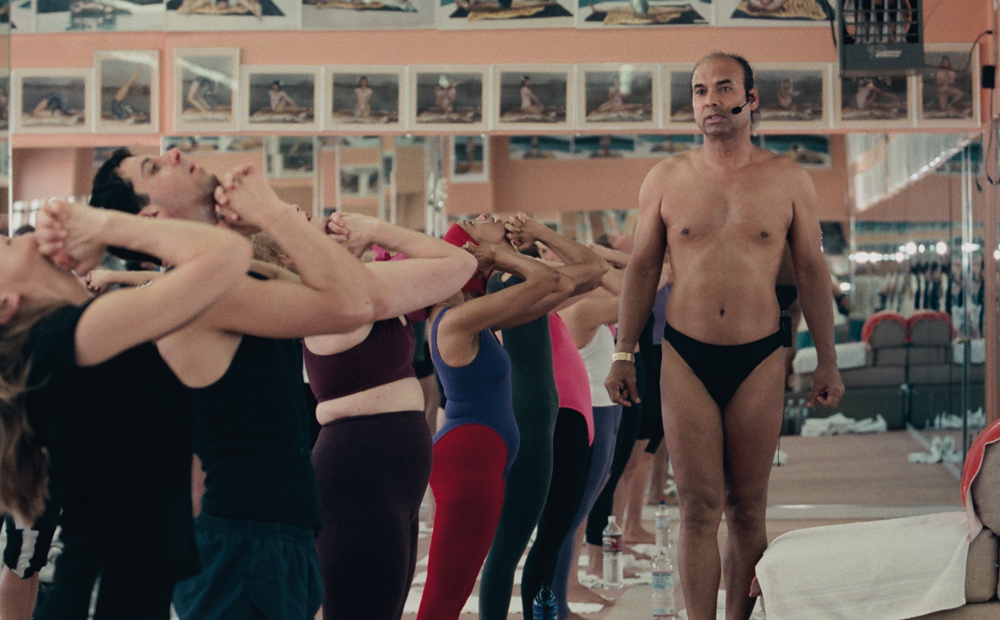It wasn’t long after the premiere of “Bikram: Yogi, Guru, Predator” at the Toronto Film Festival that director Eva Orner’s phone started blowing up with messages, both from well-wishers happy to know she had finally blown the lid off the sexual harrasment and abuse that the famous instructor Bikram Choudhury had subjected his students to for years at his popular hot yoga classes and others who had yet to share their own story.
“Just from a few reviews that came out overnight, I’ve been getting texts and e-mails and comments on social media saying “I did Bikram [yoga] and he did this to me,” says Orner, the day after the film’s premiere. “Not a lot of people have talked publicly about Bikram’s abuse and I’m guessing there are hundreds if not thousands of them because it’s been a long history and other women see this, it encourages other people to come out and talk.”
Premiering on Netflix this week, it’s quite likely that talk will lead to action as Orner has compiled a damning case against Choudhury, who is found to be as skilled at stretching the truth as he is at getting his students to bend their bodies in ways thought to be impossible under extreme heat with techniques he brought over from India. The filmmaker, who has entered her share of tense situations as a producer on Alex Gibney’s murder investigation “Taxi to the Dark Side” and director on “The Network,” in which she chronicled the effort behind Tolo TV, an independent news source in Afghanistan, finds great unrest in the less obvious battlefield of Beverly Hills where Choudhury parlayed the success of his own classes into an even more lucrative business franchising his practice, offering his disciples teacher training in hotels for $10,000 to become instructors themselves. Between a wicked sense of humor and the effectiveness of the yoga – those with ailments such as scoliosis and nagging joint pain swear by the results, his authority went unquestioned, yet the training seminars began to expose an ugly truth as women who had been harassed and molested in private by Choudhury, often using his position of physically working with their bodies as a yogi as cover, started to realize they were being preyed upon.
Orner gives the survivors of Choudhury’s abuse the space to movingly tell their stories unfettered, but finds ways to get inside his classes and reflect the larger culture that allowed him to thrive to see how he kept such criminal activities under wraps for so long, watching as mass media, fascinated by his exoticism, contributed to the mythmaking that gave him power and how the booming wellness industry, where there was considerable money in keeping up appearances in many respects, could condone such behavior. Shamefully, “Bikram: Yogi, Guru, Predator” isn’t a retrospective piece as Choudhury continues to teach and on the eve of the film’s release, the filmmaker spoke about making a documentary about the unfortunately open-ended situation, sensitively conducting interviews with the survivors and where she hopes things go from here.
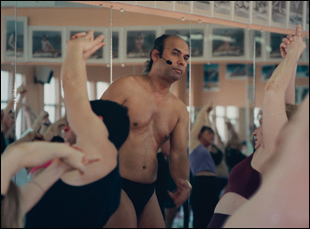
I was very aware that I didn’t want it to be overly cumbersome and I feel like you don’t need to be repetitive. Obviously, he’s done this to so many women and [while] these are isolated experiences, there’s a moment in the film when Sarah comes out and she says, “I realized it wasn’t just me,” and I think that covers it. What the biggest challenge was was who are the strongest people who move the story forward and not let it stagnate. Everyone has to have a different reason for being in the film to propel it and the biggest challenge I thought was actually the first act. We had to establish [Bikram] and make him likable and somewhat charming because we had to show why so many people believed in [what he was doing] because so many people around the world did. If you don’t establish him as somewhat appealing, then they look foolish and they’re not. So that was a challenge because I think he’s fairly despicable. [laughs] Years ago, someone had asked me to do Bikram yoga and I saw a photo of him and I’m like, “No, not for me. The whole Speedo thing wasn’t for me.”
But obviously I’ve since done lots of classes because I had to meet people and experience it and see what it does. As someone who’s spent a lot of time in war zones and has lots of injuries, I will say [the yoga] is actually really great. The heat and the stretching is really quite a powerful combination, but it’s not anything I’d pursue further and establishing him as credible and likable and funny… I mean, did you laugh in the first 30 minutes?
I did. And what I thought you did brilliantly is when Patrice Simon, one of his students, says he sounded like a lion, you actually feel that seductive quality in the voiceover you use of him teaching.
Yeah, finding those audio tapes of him were pretty valuable, and then finding people from different periods along the way, who were enamored or healed by him. I just wanted to show a wide variety of people who were, so he’d have credibility and you would understand the appeal of it. Not a lot of people have seen it yet, but a few people have said to me, they’re watching it in the first half-hour thinking, “Oh, I need to get me to a Bikram yoga class. This looks amazing.” [laughs] And then by the end, it’s like “Uh oh.”
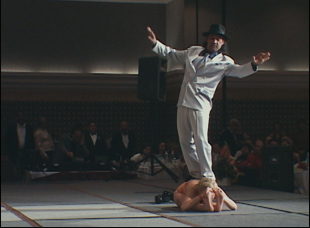
She actually was the first person I contacted and got onboard because she had the highest profile in some ways because of the court case. She was the victim who took him to court who won and still got nothing. Micki came with the lawyers and some pretty amazing footage that hadn’t been seen before and then like with any documentary, you dive into this world and you start going to yoga classes and start talking with yoga studio owners, mentioning you’re doing a film, seeing if anybody’s biting. Micki put me onto Mary Shea, [an attorney] who’s not in the film, but she represents Larissa [Anderson] and Sarah [Baughn] and a bunch of other women, so she felt comfortable enough to tell them it was okay to be part of this film. Everyone was very, very cagey at first because everyone’s had a bad experience. But we sent them some of my work and they realized I was the kind of person that they would trust and we’d build relationships. It’s always a long process, [where you] keep reaching out and reaching out and looking for people who would fill in the gaps along the way, but in a way that’s the most fun part of making a film is the discovery.
Was this a different experience for you? Generally, you’re in the middle of what you’re filming, but this story is told at a remove, but obviously at the same time you don’t want to retraumatize people in how you ask about their experiences?
It’s interesting. I’m known for doing pretty tough films, and this is a very tough story and I feel very, very strongly about it, but I was not in danger. I wasn’t in a war zone and I wasn’t going to die making this film, so it was actually a much more controlled environment for me. I think some of the women were a little hesitant at first because it does open wounds. Someone like Sarah, she’s moved on with her life, she’s married and she’s a mother and she’s put it behind her. She actually said to me during the interview, “This is the last time I want to speak about this because it’s enough.” But it’s funny because I think the film actually made her more empowered and she was very glad to do it. It was something where after all the interviews with the women, we spoke for many weeks afterwards because it definitely triggered them and as a filmmaker, I feel a real responsibility to the people in my films. They will be people I know forever and I’m eternally grateful for them and I’m always there for them.
One of the things to really note is their bravery is unprecedented because this was pre #metoo when they came out. They were young, they were publicly exposed and they were ostracized from their community. They lost their stream of income, they were vilified, they were threatened by Bikram’s inner circle, and at the end of the day, they got a raw deal [when they came out] because they had to settle and it’s not like they’re getting millions of dollars. Then someone like Micki who went through the whole process of the court case, waiting for years, [with] the publicity and the inability to work and getting victory in the end, but she still hasn’t gotten any money, I don’t know how they bear it. And he still does teacher training now where he’s still making a lot of money, and people flock to them. A couple of years ago, there were like 30 people there and now there’s upwards of 80 to 100. They’re getting bigger and he shows no remorse. That’s why I think his story’s important to get a wider audience so people know they shouldn’t be supporting him.
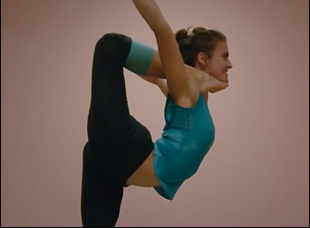
It didn’t really. And we thought about including #metoo commentary [because] as I was starting this, it was just before the very beginning of the #metoo and Time’s Up movement, so as we moved along, I thought this is becoming more and more interesting because it’s a pre-#metoo film in a post-#metoo world, and he got away with it, so it has this very dark feel about it. But I think it’s very easy for audiences to join the dots and understand the correlation [with #metoo] and didn’t want to have outside people in this film. I wanted this film to be their story and I didn’t want to take away their voices.
The only thing I found really interesting [about the larger cultural context] was how there’s confusion and mystery about why sex crimes aren’t criminally prosecuted to a large degree. I think it’s 10% of sex crimes go into court and they’re hard to prove because it’s he said, she said. Often women don’t go to the police or get medical help immediately [for the same reason] and I think #metoo has changed that to a degree. I think women are more forthcoming immediately, but the DAs are [still] reluctant to go after powerful men who are potential sex offenders. Someone like Harvey Weinstein, Time’s Up and #metoo [put] pressure Governor Cuomo in New York and Cyrus Vance, the DA, to go after him criminally and they didn’t want to. And in California, we now have Governor Gavin Newsom, who’s very liberal and I think fantastic for the state, but [the previous governor] Jerry Brown was friends with Bikram. There’s photos of them together and we have evidence of Bikram contributing money to his campaign finances. There’s a lot of history there, and it was a different time, but I think someone like Governor Newsom should see this film and he should get on the phone to Jackie Lacey, the district attorney and find out why she isn’t going after someone who’s been convicted civilly, who’s settled with numerous women in California for rape and sexual assault and try and get a criminal trial going where there’s a possibility of extraditing [Bikram] because he has an American passport.
It’s always a big expectation for a film to make a difference and with something like R. Kelly, that made a difference, but once you’ve left, it gets a lot murkier legally. [Bikram’s] predominantly in places like India, Mexico and Thailand, but now he’s doing teacher training in Spain, so if he’s moving to Europe, I wonder if there’s something that could be done. It’s hard to get someone extradited back to America, but if he came back, he would have to pay it’s almost $8 million from the civil case and it would be also great to see him in a criminal trial.
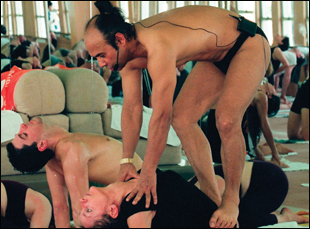
I think it’s pretty convincing, call me crazy, but I believe the women and I think everyone does. That’s something else that’s really important, coming back to the bravery of the women who did this at a time when it wasn’t okay to do, it also encourages other people to speak out. And men need to speak out more. I still think there’s a reluctance and I feel it’s so important that if men supported women in these kinds of stories, it could make a big difference. Jacob, [one of the guys] in the film, had never spoken out before this film and the night before he told me he didn’t want to do the interview, but I’m so grateful that he did. It’s so brave, and you can see it’s such a long time since this happened and he’s moved on, but [you can see] the effect of Bikram’s betrayal is quite shocking and powerful and again I appreciate that honesty. He’s such a fantastic guy and he went through so much and he felt a lot of guilt for a long time, and the power [of speaking out] is it makes other people speak out and once you start, it’s unstoppable.
“Bikram: Yogi, Guru, Predator” will begin streaming on Netflix on November 20th.




